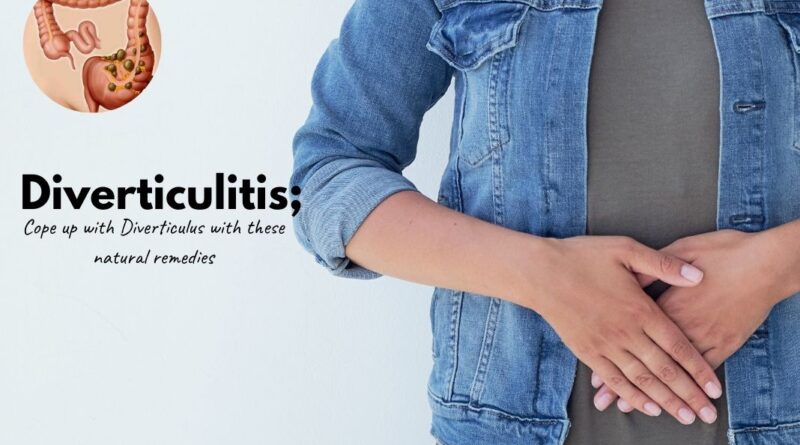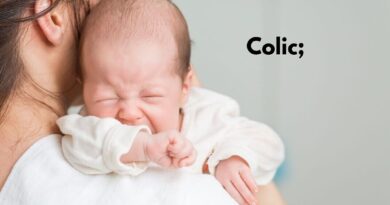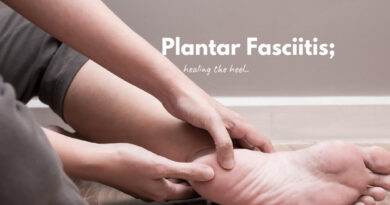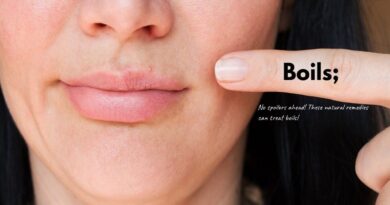Suffering from Diverticulitis? Remedies to Free Yourself from It
Diverticulitis, a gastrointestinal disease, is characterized by the formation of several tiny pouches in the large intestine which can become inflamed or infected. These pouches are known as ‘diverticula,’ and they come in both small and large sizes. The pouches can be formed anywhere along the digestive tract they are most commonly found to be at the end of the sigmoid colon positioned on the left side of the stomach.
Diverticulitis can be acute or chronic. If it is acute, you might not even know you are suffering from it because it is painless and hardly causes any symptoms. However, acute diverticulitis can manifest itself into a chronic condition with severe attacks of infection and inflammation.
The symptoms include bowel obstruction, diarrhea, abdominal pain, blood in stool, thin stool, cramping while passing gas, bloating or swelling, one can even experience nausea and vomiting.
Adam Tempeton and Lisa Strate in their article published in the US National Library of Medicine(1) report that diverticulitis has gone up from 2% to 10% in the early part of the 20th century. They further state that among all the patients, 15% to 25% develop complications that have to be surgically resolved.
Table of Contents
What Are the Causes of Diverticulitis?
The causes of diverticulitis are poorly understood, and no single cause has been identified. Many believe genetic and environmental factors contribute to the development of diverticulitis. Some other conditions which can increase the risk of diverticulitis are obesity, lack of exercise, excessive smoking, hypertension, and low levels of vitamin D.
It is also stated that a diet low in fiber can be a risk factor but data to support this is unclear. Diverticulitis can also be set in motion due to the reduction of healthy bacteria and the increase of disease-causing bacteria in your colon due to unusual bowel movements or in unhygienic conditions. Mild diverticulitis diagnosed on time can be treated with natural home remedies, diet change and rest.
Is There a Cure for Diverticulitis?
If you develop severe or chronic diverticulitis, you should visit a doctor to make sure your condition improves completely and to avoid further complications. However, you can treat mild or acute diverticulitis with a little extra care and some remedies which are natural and easy to follow.
How to Treat Diverticulitis
- Home Remedies
- Foods
- Herbs
- Supplements
- Alternative Treatments
CURE 1: Home Remedies for Diverticulitis
1. Regular Exercise
Why does this work?
Regular physical activity helps to maintain normal bowel movements and also lessens pressure in the colon. It also manages your weight, particularly abdominal obesity, which significantly increases the risk of diverticulitis. Obesity is believed to contribute to diverticulitis by advancing inflammation.
How to do?
Try to exercise first thing in the morning by doing activities like walking, running, aerobics, yoga, etc. Also, try never to skip exercising for two to three days in a row as this may break the routine and turn out to be inconvenient later.
How much to do?
Forty minutes of moderate physical activity every day will provide relief from diverticulitis.
Also Read: 20 Exercises to do at Your Desk- Get Fit at Work?
2. Drink Plenty of Fluids
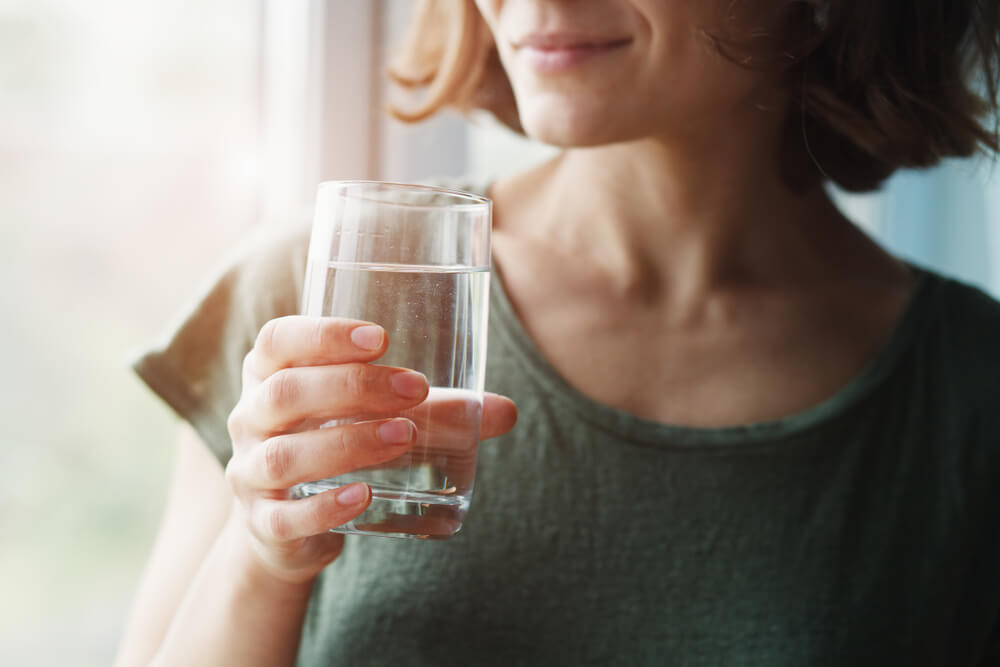
Why does this work?
A high fiber diet, which is recommended to avoid diverticulitis, only works when there is enough water in the body. Enough water content in the body ensures the smooth functioning of the digestive tract.
How much to drink and how often?
Women should drink around two liters of water every day, which comes around to nine cups. Men, on the other hand, should take three liters, which is around thirteen cups. Other fluids like juice, soup, milk, herbal tea, coffee, buttermilk, etc. also add to daily water necessities.
3. Eat Less but More Often
Why does this work?
One should eat regularly at small intervals a fiber diet to soften the stool and allow it to pass smoothly and quickly. British Medical Journal reports, a person who obtains all the calories through fewer meals per day tends to have high cholesterol.
How to eat and how often?
Try to eat five or more small meals in a day rather than two or three meals per day. Make sure the meals are high in fiber and involve plenty of water intake.
CURE 2: Foods for Diverticulitis
1. Products High in Fibre
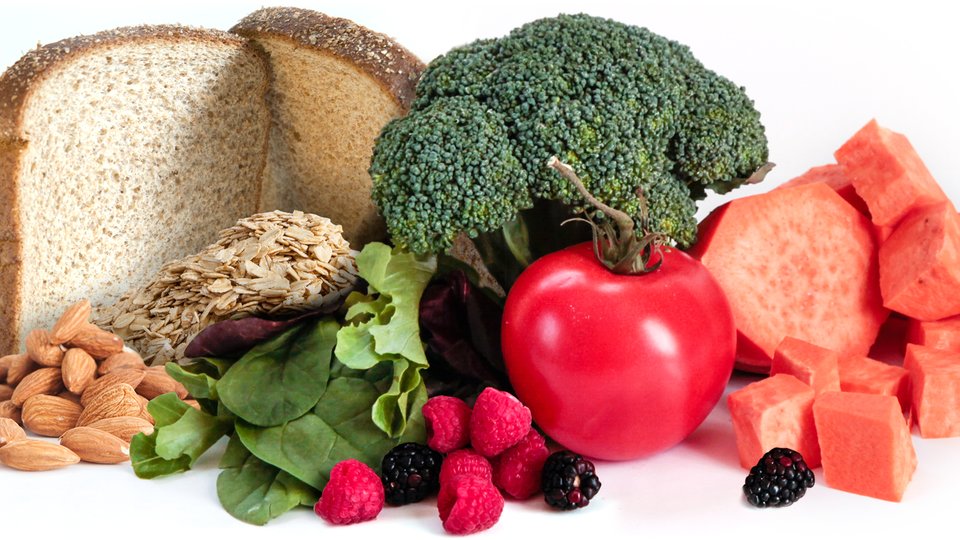
Why does this work?
A diet high in fiber and low in fat helps greatly to treat diverticulitis. High fiber does not irritate further the pouches formed on the intestine and ensures smooth bowel movement.
How to eat and how often?
A high fiber diet includes fruits and vegetables, oats, barley, brown rice, etc. Consume them in small quantities two or three times a day.
2. Spices
Why does this work?
Spices like turmeric, ginger, and garlic work towards decreasing the inflammation of the pouches because they have antiviral effects to prevent infection.
How to use?
You can add a pinch of turmeric in hot milk and drink it before going to bed two or three times a week. Ginger can be added in tea and consumed in the morning just after getting out of bed.
How much to use?
However, it should be noted that these are consumed in small quantities for diverticulitis relief because large quantities can irritate the lining of the stomach.
Also Read: Cinnamon uses and its medicinal properties
3. Whole Grains
Why does this work?
These are the best source of dietary fibers. They will prevent inflammation and help treat diverticulitis effectively.
What to eat and how much?
Whole grain bread, pasta, crackers, etc. are high in fiber and also take care of your taste buds. You can eat bread in one of the meals of the day or take two to three crackers with the evening tea.
4. Aloe Vera Juice for Diverticulitis

Why does this work?
Aloe vera has numerous health benefits, including preventing constipation and reducing pain and cramping.
How to use and how much?
If fresh aloe vera is not accessible, you can buy aloe vera juice readily available in the grocery stores. Drink one cup a day to reduce the symptoms of diverticulitis.
CURE 3: Herbs for Diverticulitis
1. Marshmallow Root
Why does this work?
Marshmallow root tea is a strong herb that strengthens the body and maintains the digestive system of the body. It also combats inflammation and infection.
How to use?
Just like any other herb marshmallow root can also be consumed in the form of dry extract. To make tea just boil the extract in one cup of boiling water. Strain it and drink it hot.
How much to use?
It is beneficial to drink it every day in the morning. However, it is not easily available, so drink it whenever you can get hold it. Once or twice a week is also beneficial.
CURE 4: Supplements for Diverticulitis
Food is the best source to increase the fiber content in the body, but one can also take additional supplements to ensure faster improvements and diverticulitis relief.
1. Probiotics for Diverticulitis

Why does this work?
Probiotics can be understood simply to be good bacteria that treat diverticulitis and ensures proper digestion.
How to use?
They are available in many forms like powder, tablets, and capsules. They are also found in yogurt and fermented vegetables. However, different types of bacteria have different kinds of strains. It would be advisable to consult your doctor to determine which one would be the most beneficial for you.
How much to use?
It would be advisable to take them two to three times a week for relief from diverticulitis.
3. Omega 3 Fatty Acids
Why does this work?
Fish oil is rich in this and helps fight inflammation. You can take a diet rich in omega 3 fatty acid or take supplements.
How to use?
If you are not consuming it directly in your diet, you can then take it in the form of tablets or capsules.
How much to use?
Take it in a quantity of 1,000 mg, one or two times a day. However, do not take high quantities of it as it has blood-thinning properties.
4. Glutamine
Why does this work?
It is as an amino acid not mainly known to treat diverticulitis, but it ensures the proper functioning of the entire digestive tract.
How to use and how much?
It has to be taken 400 mg, four times a day between meals. However, if you are diabetic, have liver disease or a history of manic episodes, then do not take this. It can be taken in the form of capsules or tablets.
| Although the stomach is believed to be the center of digestion, it is involved in the very little digestion process. The majority of the work of digestion and absorption of nutrients is done by the small intestine. |
CURE 5: Alternative Treatments
1. Acupuncture
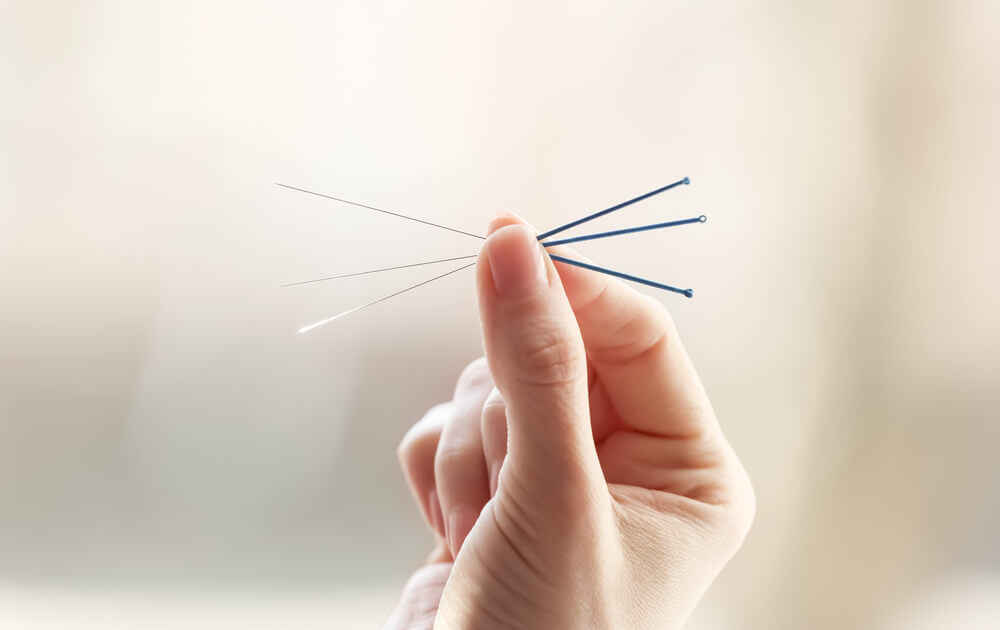
Why does this work?
A traditional Chinese practice, it greatly relieves pain and stress and provides relief from diverticulitis.
How does it work and how much to use?
It involves inserting thin needles into particular points in the body. The acupuncturist will decide how many sessions you require weekly or monthly.
2. Ayurveda
Why does this work?
Ayurveda improves dietary habits and compensates for the lack of fiber in the diet. Along with improving digestion is also relaxes the muscles to help pass a hard stool.
How to use?
Some effective medicines from the ayurvedic plants are Sanjivani Vati, Agnitundi Vati, Vatsakadi Churna, etc. All these medicines can be taken directly from the mouth before or after food.
How much to use?
Based on their knowledge and experience, the doctor may recommend one or more treatments simultaneously for two months or more.
3. Massage
How does this work?
There are several points on the body when massaged can relieve the pain in the abdomen for a person suffering from diverticulitis.
How to use?
Working on these points can be beneficial. Some of the points are on the arch of the foot, above the tendon of the big toe, etc.
How much to use?
If you are doubtful in administering the massage yourself, you can always visit a professional.
| There are more than a thousand acupoints across the human body. |
Prevention Tips
1. Refrain from Smoking and Alcohol
Smoking and alcohol can irritate the already affected lining of the stomach. It might then cause a burning sensation and a feeling of nausea.
Also Read: Smoking During Pregnancy
2. Avoid Red Meat
Red meat is hard to digest as it is high in fat and sugar. Avoiding it can reduce the symptoms of diverticulitis.
3. Avoid High-Fat Food
High-fat food can block the opening of the intestine and cause inflammation, which can be painful.
4. Avoid Nuts and Seeds
Nuts and seeds can get stuck in the pouches and cause infections and more complications. If stuck, they would have to be surgically removed.
| The digestive system is more prone to cancer than any other part of the body. |
When to See the Doctor?
If you notice severe symptoms of diverticulitis and the pain becomes unbearable, it is recommended that you visit a doctor. The doctor might do a blood test to check the severity of the infection. Some other tests which can be administered by the doctor are CT scan, X-ray of the abdomen or ultrasound. As for the treatment, the doctor might give you some oral antibiotics and recommend bed rest and liquid diet to relieve the pressure on the digestive tract.
How to Prevent Diverticulitis?
One often wonders what to do for diverticulitis. The best way to prevent and treat diverticulitis is to make diet changes combined with lifestyle changes. Along with exercising regularly and drinking plenty of water, one should also ensure regular bowel movements and good bowel hygiene. Make sure you go to clean places and do not defecate in the open as it increases the chances of catching an infection.
The American Dietetic Association also recommends that everybody should maintain a high fiber diet regardless of whether you have diverticulitis or not. A high fiber diet prevents constipation and provides other health benefits like cholesterol maintenance, lowers blood pressure and reduces the risk of other gastrointestinal problems.
Did you know at least 40%(2) of us suffer from diverticulitis by the age of 60 and most of us are oblivious of the fact? Both men and women are equally affected by it. Of this half of it develops into chronic diverticulitis where it becomes crucial to consult a doctor and undergo surgery if required.
Most of it can be treated by appropriate medications and rest, but sometimes the case worsens due to the perforation of the colon, bowel obstruction, fistula, etc. Hence it is essential to follow a healthy lifestyle with regular exercise and nourishing diet to ensure your safety as well as that of your loved ones.
FAQs
1. Is diverticulitis genetic?
No single cause has been identified for diverticulitis, but experts believe that multiple genetic factors combined with environmental factors do contribute to its development. Along with heredity, aging also plays a role in the development of diverticulitis.
2. Is diverticulitis contagious?
No, diverticulitis is not contagious. However, both men and women are equally prone to suffer from diverticulitis. Older people are more prone to suffer from diverticulitis.
3. Is diverticulitis curable through surgery?
In the surgical process, the affected part of the colon is removed when the symptoms become more pronounced and pain severe. The surgery is only recommended by doctors when the condition worsens over time, and home remedies do not seem to treat diverticulitis.

